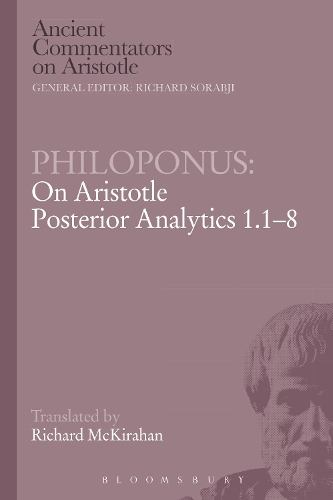
Philoponus: On Aristotle Posterior Analytics 1.1-8
(Paperback)
Available Formats
Paperback
Published: 26th March 2014
Hardback
Published: 1st November 2011
Paperback
Published: 26th March 2014
Paperback
Published: 26th March 2014
Paperback
Published: 26th March 2014
Paperback
Published: 26th March 2014
Paperback
Published: 26th March 2014
Paperback
Published: 26th March 2014
Paperback
Published: 26th March 2014
Paperback
Published: 26th March 2014
Paperback
Published: 26th March 2014
Paperback
Published: 26th March 2014
Paperback
Published: 26th March 2014
Paperback
Published: 26th March 2014
Paperback
Published: 10th April 2014
Hardback
Published: 1st April 2010
Publishing Details
Philoponus: On Aristotle Posterior Analytics 1.1-8
By (Author) Philoponus
Translated by Richard D. McKirahan
Bloomsbury Publishing PLC
Bloomsbury Academic
26th March 2014
United Kingdom
Classifications
Tertiary Education
Non Fiction
Philosophy: epistemology and theory of knowledge
121
Physical Properties
Paperback
192
Width 156mm, Height 234mm
277g
Description
Aristotle's Posterior Analytics elaborates for the first time in the history of Western philosophy the notions of science and the requirements for the distinctive kind of knowledge scientists possess. His model is mathematics and his treatment of science amounts to a philosophical discussion, from the perspective of Aristotelian syllogistic, of mathematical proofs and the principles they are based on. Chapters 1-8 expound the foundations of Aristotle's theory, pointing out the similarities and differences between scientific knowledge and other types of knowledge, establishing the need for basic principles, and identifying the types of principles and the source of necessity associated with scientific facts. Philoponus' massive commentary, the most complete ancient discussion of Posterior Analytics Book 1, offers uniquely valuable testimony to the way this book was read and understood in late antiquity, as well as providing information on earlier interpretations. Of particular interest is Philoponus' account of scientific principles, which is based not only on Aristotle but also on the Greek mathematical tradition, especially Euclid and his commentator Proclus.
Author Bio
Richard McKirahan is the Edwin Clarence Norton Professor of Classics and Professor of Philosophy at Pomona College, Claremont, California, USA.
